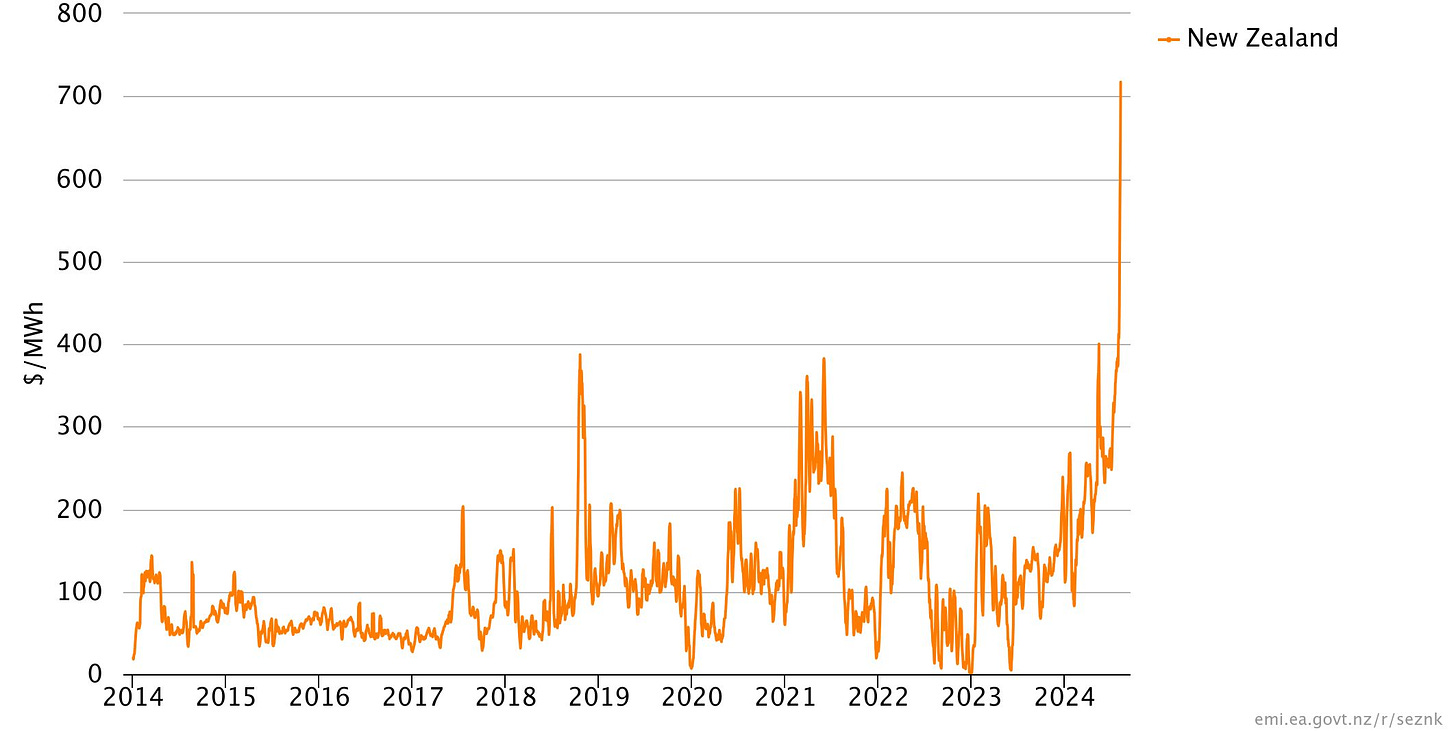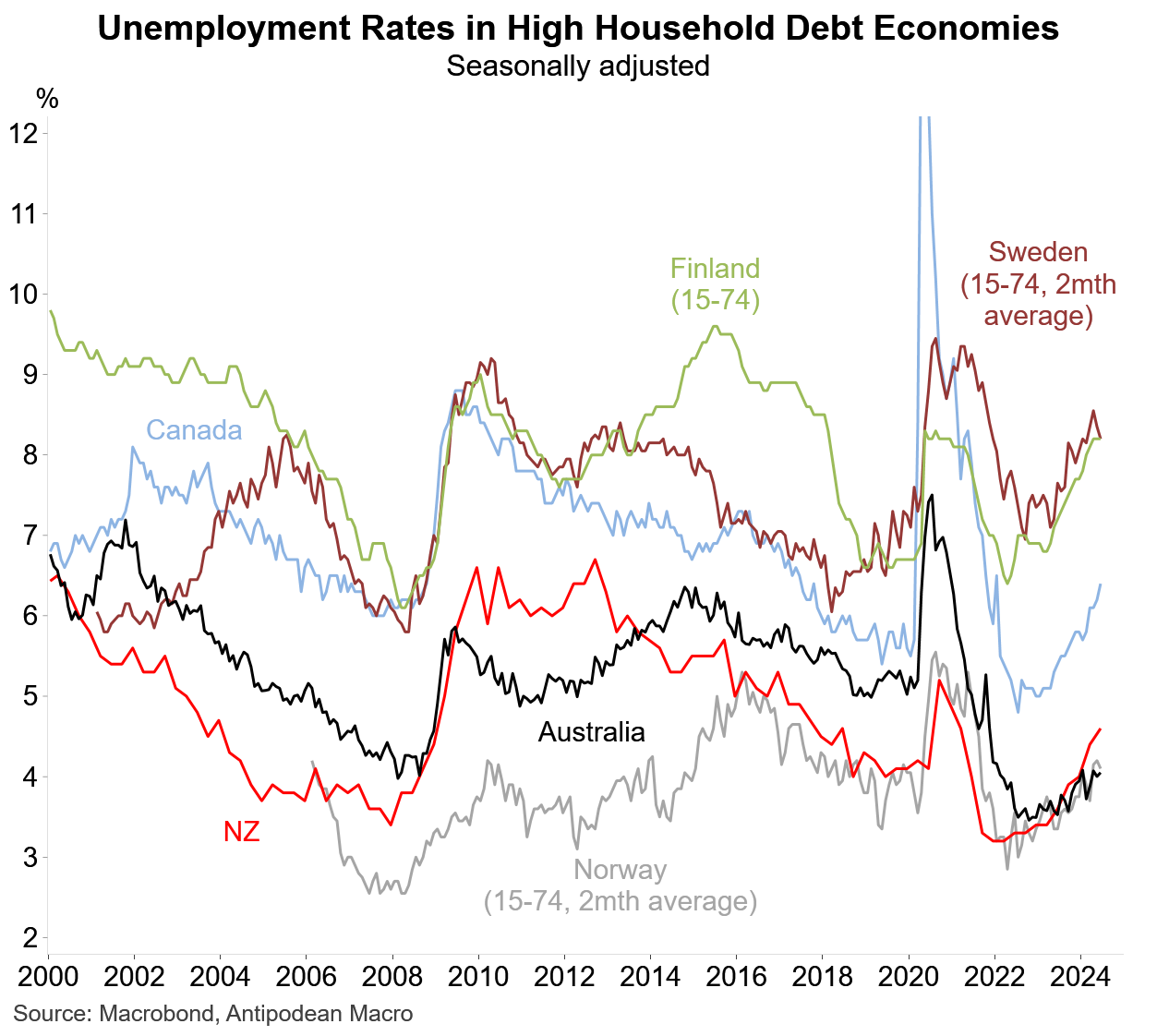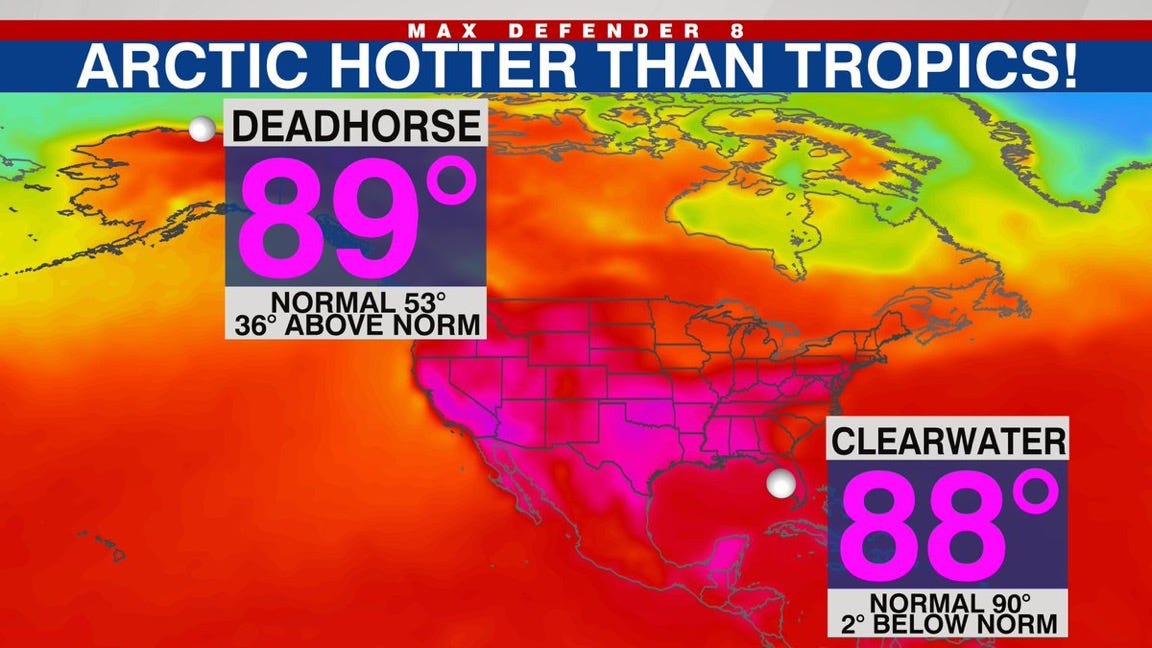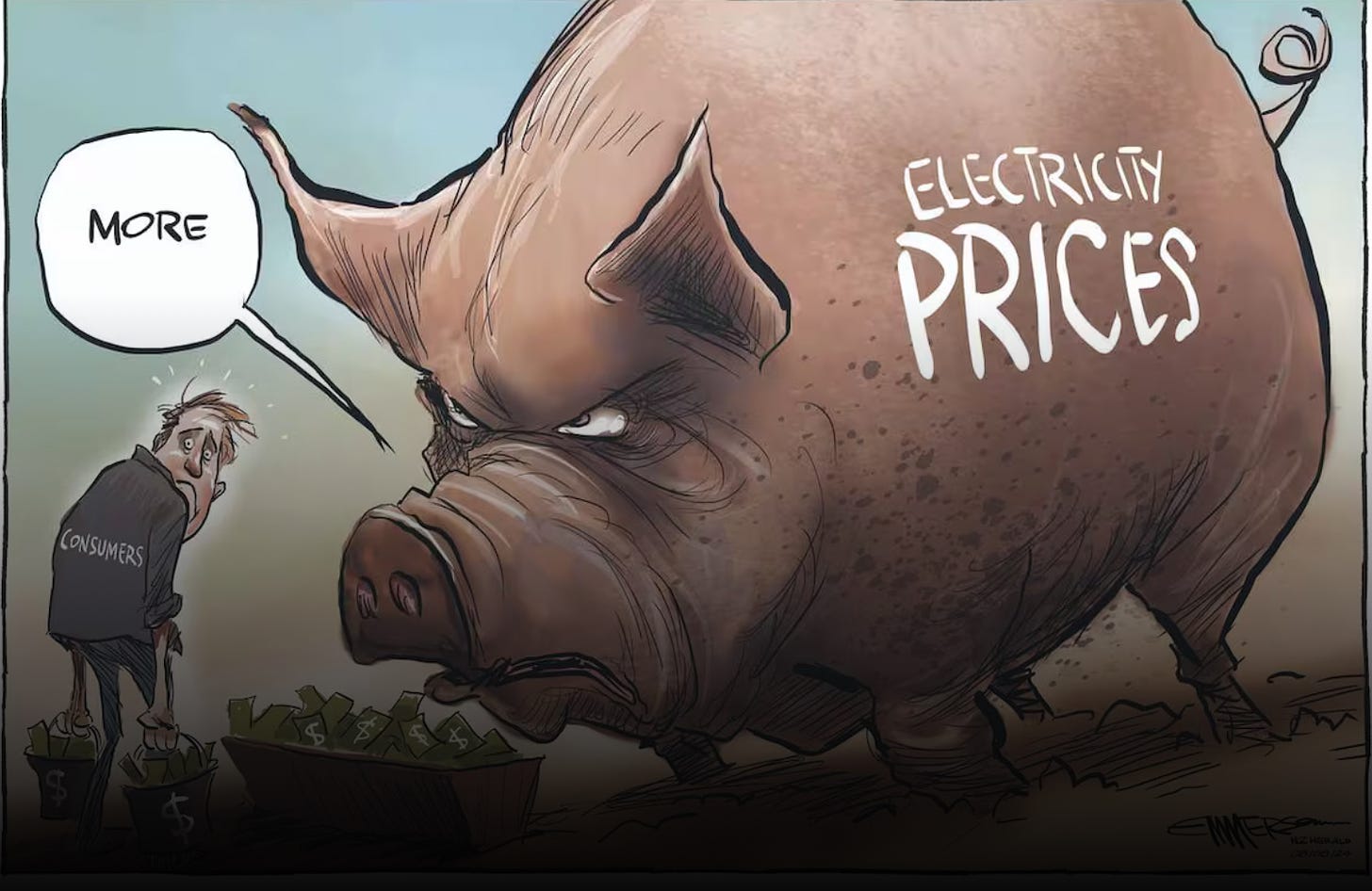TL;DR: My top six things to note around housing, climate and poverty in Aotearoa’s political economy on Thursday, August 8 are:
1. Willis screws down Govt share of GDP even tighter
Directive to public service freezes spending at current Budget baselines
Finance Minister Nicola Willis issued a Workforce Policy Statement yesterday through the Public Service Commission that effectively stops the health, education, social development, child protection, economic, primary industries and every other ministry from increasing spending beyond current baseline levels. That means any pay increases for inflation or increased staff numbers to deal with population growth will have to be paid for by cutting costs elsewhere.
The effect is to screw down the Government’s share of GDP to below 30% even faster, assuming nominal GDP, public sector wages and the overall population keep growing, which is what Treasury is forecasting. The expectation is the same public services and benefits can be delivered for a larger economy and population, but with fewer staff per capita and less spending per capita.
The effect is to screw down the fiscal lid on the Government even tighter and put even more pressure on hospital, school, social work, Police and other staff to deliver even more with less.
“The Government has set a clear expectation that future workforce costs, including collective bargaining and pay increases, are to be funded from within existing budget baselines. Agencies are also expected to reduce spending on consultants and contractors, which has blown out in recent years, while keeping tighter control over workforce size.” Nicola Willis’ directive to public servants.
In my view, this further screwing down of the lid on the pressure cooker of our public sector will force a release of more steam in the form of staff opting to leave the country for better wages, less stress and better public services elsewhere.
2. Energy crisis erupts after investment failure
Factories close & bosses plead for intervention as power prices explode
Wholesale electricity prices have spiked to more than eight times their long-run-average prices in the last week as a perfect storm of a dry winter, gas shortages and a decade-long failure by the big four gentailers to invest in renewable electricity generation converged to slam industrial power users. Manufacturers are now describing the prices and gas shortages as an ‘energy crisis’ and have called on the Government to intervene.
Waste paper and cardboard recycler Oji closed its Penrose plant yesterday at a cost of 75 jobs, while Winstone announced on Monday it would shut its pulp and paper mill at Ohakune, putting 300 out of work.
The New Zealand Manufacturing Alliance wrote to Energy Minister Simeon Brown last week to ask for a meeting this week to discuss intervention, Oliver Lewis reported this morning for BusinessDesk-$$$.
NZ wholesale electricity price (7-day moving average)

3. Solutions: Urgently install solar, rather than import LNG
Rather than ramping up renewable investment, especially of increasingly cheap solar and batteries, Energy & Transport Minister Simeon Brown says the Government is moving urgently to import more gas and build more gas-fired electricity generation. He blamed Labour for banning new exploration offshore for gas for the shortages, although there was $2 billion spent on offshore and onshore exploration using existing permits that didn’t increase gas supplies. The state-controlled gentailers, Meridian, Genesis and Mercury, also skimped on investing in new generation through already-consented wind farms and through grid-scale solar and batteries. That was to maximise dividends to Governments of both flavours over the last decade.
The Government is now scrambling to import Liquefied Natural Gas (LNG) supplies, which would require massive investment in port infrastructure to liquefy and transport the gas. Brown spoke in the General Debate in Parliament yesterday about the crisis and called for a bipartisan approach with Labour, after accusing Labour of causing the crisis. Here’s Brown’s comments (bolding mine):
After stifling investment in the gas sector, after increasing our sovereign risk as a country, and after six long years of Megan Woods thinking she knows best, New Zealand now finds itself in an energy crunch with dry year conditions being compounded by a low supply of gas, which is critically important at this time. The high electricity prices New Zealanders are facing are deeply concerning and a direct result of those policies.
This Government is taking action to respond to this through the Gas Security Response Group and the work the Gas Industry Company is leading on this issue. The Gas Industry Company is currently leading on two critically important work streams, which we reported to Cabinet on Monday.
Firstly, the work stream on the feasibility of importing liquid natural gas, which is a lower-emissions fuel than coal, to improve gas supply in the short to medium term. I think this is a significant thing to have to be investigating as a country. This is a significant thing to be investigating as a country, because, as a country, we have been blessed with natural resources, but because of the last Government's reckless policies, we are being left in this situation.
But we must keep the lights on. We must support our industries. We must ensure New Zealand has the energy that we need, and so we're working on that. The group's also investigating how to increase investment in flexible gas-based generation to ensure there is plant available to meet our future electricity needs for flexible generation.
This Government is taking this issue incredibly seriously. We will not stand by while industry shuts down. We need to have the energy security this country needs. The reckless policies of the last Government have been thrown in the bin. What we need is a bipartisan approach where they give confidence to the sector so this investment can happen. I call on them to back this Government so we can have the energy security this country needs. Simeon Brown via Hansard
Brown made no mention of ramping up solar and battery investments, which would be much faster and cheaper to install, and would improve the resilience of the rest of the electricity sector, especially of volatile wind and hydro generation.
Oh. And by the way. It wouldn’t produce higher emissions. Brown made no mention of the climate or emissions in his comments yesterday.
4. Quote of the day
‘Please bail us out because we didn’t plan ahead to invest in renewable’
“Our challenge that we put to the Government is for the urgent development of a short-term solution to provide some industry relief while a longer-term market fix is being developed.” Mark Ross, the chief executive of the Wood Processors and Manufacturers Association of NZ, in a letter on behalf of the NZ Manufacturing Alliance via BusinessDesk-$$$ this morning.
5. Chart du jour
Our unemployment rate is rising faster

6. Climate graphic/chart/pic of the day
At 32 degrees celcius, there’s parched horses and hot water

The best of the rest
Top six scoops & breaking news elsewhere on August 8
Council Scoop: 'Covered up': Auckland Council's $315m in 'secret' settlement payouts NZ Herald-$$$’s Lane Nichols
Health Scoop: ‘Hundreds’ of international nurses are leaving because they can't find jobs. There are still nurse vacancies in the health system but international nurses are struggling to find work and some are leaving for Australia. Stuff’s Bridie Witton
Poverty Investigation Senior public servants on notice over abuse in care failings Newsroom’s Laura Walters
Poverty Scoop: Police admit winding back ‘low-risk’ calls could be fatal Newsroom’s Emma Hatton
Retirement Scoop: Retirement villages ignored Commerce Commission warnings Newsroom-Pro-$$$’s Andrew Bevin
Justice Scoop: End to coordinated terror response ordered within weeks Newsroom’s David Williams
Top six deep-dives & analyses elsewhere on August 8
Poverty deep dive: Abuse survivor decries government's 'pretty contradictory' actions RNZ’s Tim Brown
Climate deep dive: 'It will wipe out this village' - Fears about council's stopbank plan RNZ’s Alexa Cook
Climate deep dive: 'Urgent' protection needed for coastline homes, long-awaited report finds RNZ’s Alexa Cook on the ‘Clifton to Tangoio Coastal Hazards Strategy 2120’ report
Immigration deep dive: Actor, directors, make-up artist among record number of asylum claimants RNZ’s Gill Bonnett
Poverty deep dive: Kiwis caring for disabled family members being pushed to the brink RNZ’s Felix Walton
Climate deep dive: Council told to tread carefully with flood model NZ Herald’s Al Williams
Top Six Op-Eds & columns elsewhere on August 8
Op-Ed by Dr Catherine Knight Even Thatcher realised the need for govt action on climate Newsroom
Explainer column by Lloyd Burr Explained: Decades of tinkering with NZ’s health system Stuff
Column by Luke Malpass NZ’s sovereign risk gas bill comes due. Years of poorly designed climate policies have helped create an energy crisis which now looks all but certain to require imported LNG to help fix The Post-$$$
Column by Jack McDonald: Challenging the Crown long overdue. Last week Ngāpuhi created media headlines when they walked out of the National Iwi Chairs Forum (NICF) meeting with the Prime Minister in protest over the policies of his coalition Government. The Post-$$$
NZ Herald Editorial No relief for 'squeezed middle' as rates rises gobble up tax cuts NZ Herald
Column by Chloe Swarbrick Deny basic facts and hope for the best? Our children deserve better NZ Herald
Top six Journal of Record items on August 8
Economy: Stats NZ reported 4.6% unemployment in the June quarter, the highest rate since March 2021, with almost half the 1% rise since last year accounted for by young people. Notes: Westpac said the unemployment rise fulfilled the RBNZ's May projection, while BNZ predicts another roughly 1% rise in unemployment over the coming 12 months. ANZ predicted the RBNZ will leave the OCR at 5.50% next week, but wouldn’t rule out a cut.
Climate: Transpower reported lower lake levels and sharply higher wholesale power prices.
Budget: Nicola Willis announced a new policy statement on public sector employment relations which emphasises "fiscal sustainability and performance." Government agencies will be expected to reduce spending on consultants and contractors, and link executive salaries to outcomes, among other measures. News and reports: RNZ, NZ Herald-$$$
Oranga Tamariki: Children’s Minister Karen Chhour announced delays to renewing Oranga Tamariki contracts were the result of her asking it to evaluate hundreds of external service providers, and that there will be no reduction in frontline services. She claims Oranga Tamariki has been a "cash cow" for ineffective service providers. News and reports: 1News, The Press-$$$, NZ Herald
Work: Unite Union criticised McDonald's new online system for co-ordinating remediation payments for current and former employees owed holiday pay it miscalculated between 2009-2020. National Secretary John Crocker said McDonald's online system automatically deduces what they claim are overpayments from the total remediation sum and some ex-franchisees were refusing to pay former workers. News and reports: 1News
Housing: The New Zealand Initiative released research showing that central government could boost council budgets by sharing portions of tax revenue from new housing developments. The research explores several ways to structure revenue-sharing to encourage housing development and council service provision.
And finally, some fun things
Cartoon of the day

Timeline-cleansing nature pic
‘Crouch. Pause. Engage.’
Mā te wa
Bernard














Share this post